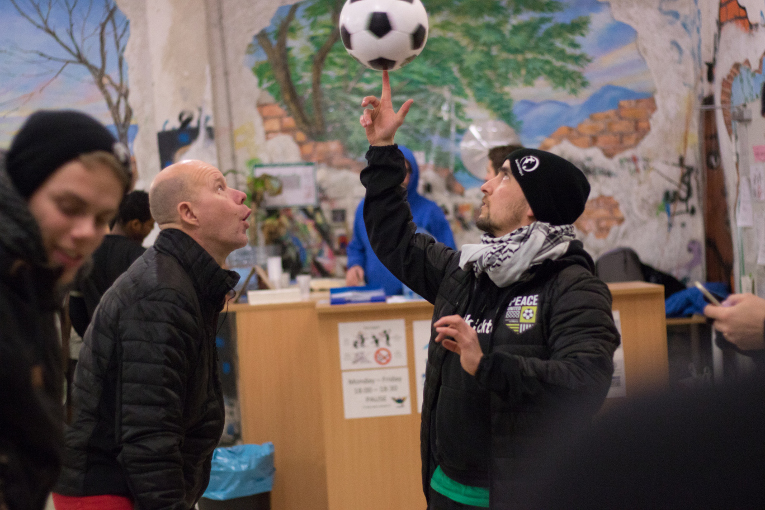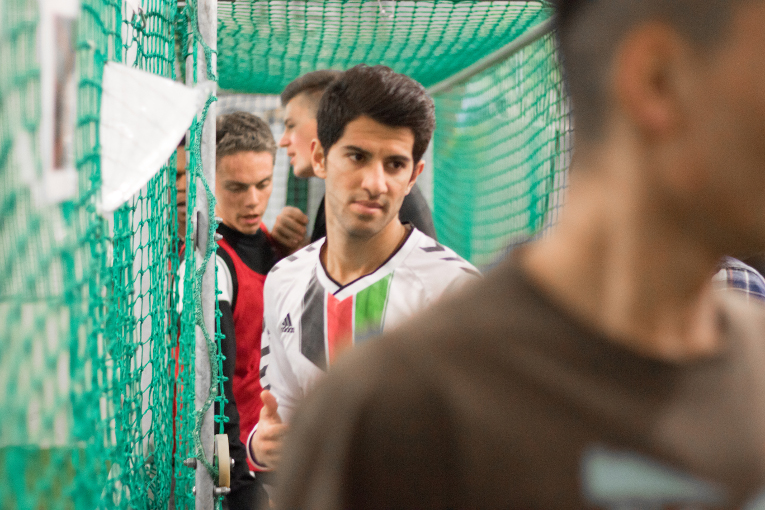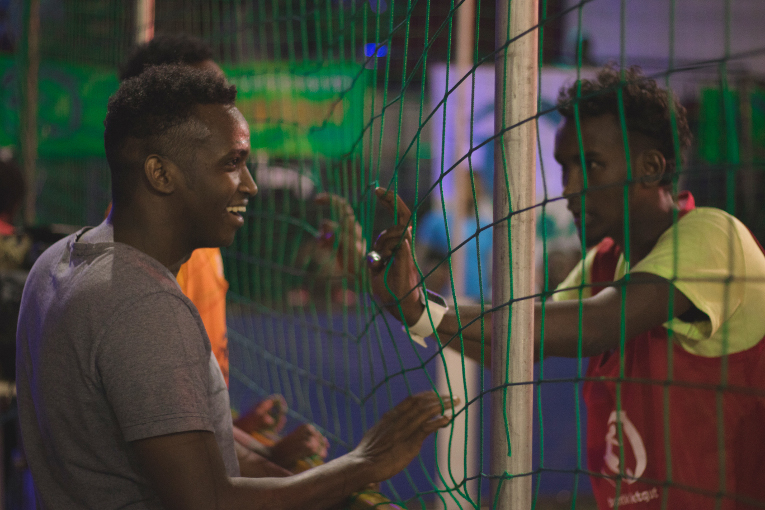Football breaks down walls in society
Football facilitates integration into society better than any other process. No matter how differently society treats individuals; players on a football pitch are all equal.
The atmosphere in the reception centre at the Olympic Stadium in Munich was dejected and tense as a record number of over one million asylum seekers arrived in Germany in 2015.
29-year-old Jan Saddei volunteered at the stadium and remembers how hundreds of asylum seekers slept in giant rooms. Nearly 80 percent of them were men and they spoke dozens of languages.
“People are competing over everything in the reception centres; the best bunks, the best rooms, food and appointments with social workers”, Saddei says.
Saddei has studied sports coaching and loves football. The reception centre offered no activities to asylum seekers until Saddei decided to bring in a bag full of footballs and team vests and organised a tournament.
“It was the first time they were able to do something together, and they had fun.”
Today, Saddei has gathered residents of the Bayern Kaserne reception centre of Munich to a Peace United tournament. Matches are played on an indoor pitch set up in an old storage building.
Football has become a full-time job for Saddei. He coordinates football practices for as many as 600 refugees and asylum seekers in the Munich area through the organisation Buntkicktgut. Between 30 and 35 practice sessions are organised every week.
Not long ago, most of the young men in the reception centres were lying in bed, browsing through entertainment on their mobile phones, enclosed in their own little world. Saddei went around knocking on people’s doors with a football in hand.
Words were not needed. Faces lit up just from bouncing the ball, and mentioning “Messi”, and now the ball passes quickly from player to player.
“In everyday life, the language barrier is a challenge, but when the ball appears, everyone knows what to do”, Saddei says.

Jan Saddei from the organisation Buntkicktgut coordinates football practices for refugees in Munich. Finnish sports commentator Kaj Kunnas (left) admires Saddei’s skills during a Peace United tournament.
In football, the language you speak doesn’t matter
The rules of the game are the same whether you are from Afghanistan, Syria, Ethiopia or Nigeria, says Saddei. People communicate through the ball and the game makes everyone smile.
The life of the game is 20-year-old Masoud, who entertains others with his tricks. The Afghan youngster has been waiting for his asylum decision for over a year and dreams of becoming a barber.
Above all else, Masoud wants to live where it’s safe. He fled the bloody life of his hometown Kunduz with his cousin in late 2015. The extremist movement Taliban has repeatedly attacked the city.
Masoud’s escape from Afghanistan to Europe through Pakistan, Iran and Turkey took six weeks. Such a journey requires carefully prioritising what to carry, but Masoud kept one important personal item through it all: a football jersey.
“I have played football since I was little and wanted to keep playing no matter where I ended up”, he says.

20-year-old Masoud preparing for his Peace United match.
Amidst war, football is more important than ever
The story of Buntkicktgut began 20 years ago when the previous large wave of refugees entered Germany. Matches were so popular they continued even after the refugees integrated into society.
Tournaments quickly grew into a league that spread out from Munich into other cities. In Munich alone, in different age groups, there are more than 2,500 players in over 200 teams.
Saddei says playing football facilitates integration better than any other process. The players originate from about a hundred different countries with native Germans participating as well. Society might treat people differently, but on the pitch players are equal. Football helps them learn the language and make new contacts.
“Children and the young are particularly unprejudiced and through them parents come closer together too”, says Saddei.
31-year-old Mahmoud arrived in Munich from Syria a little over a year ago. He met Saddei at football practice at the Bayern Kaserne and asked if he could assist with the drills, as he is a physical education teacher. He has since been granted asylum and he is now coaching at Buntkicktgut, in charge of three youth teams.
Amidst war, the importance of football becomes highlighted, Mahmoud says. He coached football practice for children in Syria, before he himself had to flee.
In extreme situations it is important to maintain some normal operations, particularly for the children and youth. Without football and other hobbies, war gets the upper hand.
“If all children and young people see are soldiers and death, their imaginations narrow. In Syria, many young people only want to join the army or become police officers, and there is also the danger of them ending up in extremist groups”, Mahmoud says.
“Football serves as therapy for them. It helps them work through their traumas, boosts their confidence and gives them hope for the future.”
Football is a life-saver for many

Football works as an outreach because everyone knows the game and the rules are the same everywhere.
Peace United plays for peace also in Finland
- Finn Church Aid has been organising Peace United football tournaments from the Zaatari refugee camp in Jordan to Finland.
- At refugee camps, experiencing personal achievements, improving self-esteem, making new friends and getting hope for what’s to come protect young people from the recruitment efforts of extremist groups. In Finland, football matches have been used as a way for asylum seekers to get to know each other and their new Finnish neighbours.
- Peace United has received the John Wikström Award at the Finnish National Sports Awards, and the Respect Award of the Football Association of Finland. The campaign is sponsored by former and current top footballers Mikael Forssell, Laura Österberg Kalmari, Aki Riihilahti, Shefqi Kuqi, Nora Heroum and Nikolai Alho.
How to organise a Peace United tournament
- Secure a location and pick a reliable referee, who will divide players into mixed teams. The idea is to play with people you don’t know, you don’t normally get along with or you don’t share a common language with.
- Notify Finn Church Aid about your match and set an order for free Peace United match balls, stickers and advert posters. 15 team vests and a Peace United trophy banner are also available.
- Finn Church Aid will also assist you with marketing and communications for your event.
- For more information, visit peaceunited.fi/en
At Bayern Kaserne, Saddei divides players into four teams. The idea in both Peace United and Buntkicktgut matches is to play in mixed teams so the players get to know and trust each other.
If the players got to decide, they would most likely form the teams based on nationality or language.
That runs the risk of confrontation which may lead to conflict when someone tackles an opponent too aggressively and language barriers lead to misunderstandings. A mixed team communicates better with another mixed team.
“It is also important to find a reliable referee for the matches”, Saddei says and dons the responsibility himself today.
The game is fast-paced and everyone is eager to show off their individual skills. But team effort intensifies with each match. It’s clear that for everyone here football is primarily about having fun.
Players speak different languages but tone makes it easy to deduce when someone is requesting a pass to an open scoring position. Each goal is celebrated by a series of high fives.
Football is an efficient way to build bridges because everyone knows the game, their fondness for it not limited by geography, religion or ethnicity. At reception centres football becomes a life-saver.
It’s hard to find meaningful things to do without a work permit or a chance to get an education, Saddei says. Football practice allows people to vent their frustration, and regularly organised tournaments are the highlight of the week.
“Winners are handed a trophy, and their Facebook-updates show they are genuinely proud of it.”
Text: Erik Nyström Photos: Aada Harju